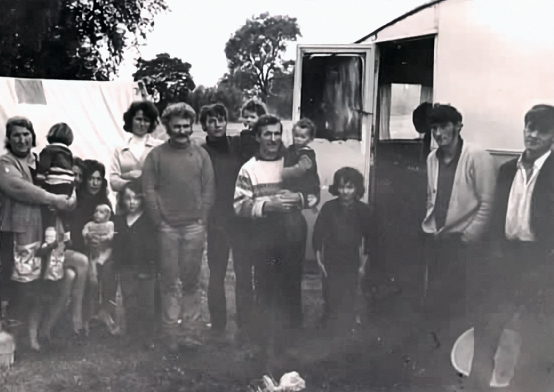Biography
Rokus de Groot is a Dutch musicologist and composer from Aalst in the Netherlands.
Rokus began his career by studying musicology at the University of Amsterdam; his ethnomusicology teacher, Ernst Heins, was in contact with Hamish Henderson of the School of Scottish Studies, and so it was arranged that he and fellow musicology student, Marita Kruijswijk, would conduct six weeks of fieldwork under Hamish’s supervision. The pair arrived in Edinburgh in the summer of 1971:
Marita recalls: “Hamish Henderson gave us addresses from all kinds of musicians, and he also lent us a tent in case we couldn’t find an overnight stay. So we visited many musicians, usually at their homes and made recordings of their music with a tape recorder. But Hamish had also advised us to go to a farm where Travellers lived in caravans and picked raspberries as seasonal workers. We then decided to pick raspberries too, because in the evenings and especially on weekends we could easily get in touch then with the Travellers and we also could be with them when they started to make music.”
In addition to recording songs and instrumental music from many Travellers in the berryfields of Blairgowrie, Rokus and Marita called on celebrated tradition bearer Belle Stewart and family while in the area. Moving further north, they visited John ‘Molecatcher’ McDonald of Pitgaveny, who performed many songs with his characteristic melodeon accompaniment. Performers in Tain, including Robert Macrae and Mararet 'Peggy' MacLeod, contributed songs and pipe/fiddle music, while many Gaelic songs were recorded in Cromarty and Muir-of-Ord from the likes of Peter Dalgetty and Belle Anne MacAngus . In total, Marita and Rokus made a great many recordings - 26 reel-to-reel tapes - over much of the north of Scotland.

In 1974, Rokus was awarded his MA in musicology based on a thesis about come-all-ye ballads as collected in his Scottish fieldwork and other sources. However, his experience of Scottish traditional music left a deep and lifelong impression lasting up to the present day:
"What especially touched me and still fascinates me, is the intimate intensity of solo singing (without accompaniment): during home ceilidhs, singers, as well as the others present were visibly absorbed in the unfolding of the sound - no printed paper interfered in their personal renderings of personal versions of a ballad or song. This inspired me to compose solo voice song cycles, like 'In Love with the Dancer: Songs of Mirabai' for soprano or tenor (1993) and recently 'A quintet of Rumi quatrains for bass solo' (2023). [...] Meeting with Gaelic poet Sorley Maclean [...] inspired me to compose 'Winds of a Far Air' for flute and soprano saxophone. Yet another source of inspiration still moves me: the Gaelic Psalm singing in the Hebrides."
Rokus would go on to earn a PhD at the University of Utrecht, and spent much of the next forty years as an academic musicologist and composer, both in the Netherlands and abroad. He retired as Emeritus Professer of Musicology at the University of Amsterdam in 2012, and continues to compose and publish music.
